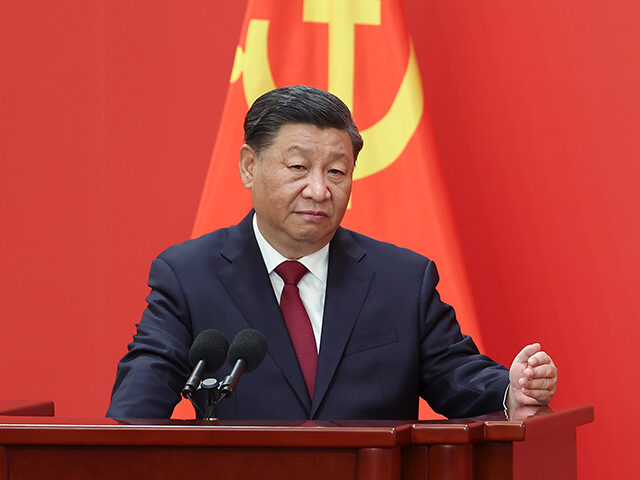Chinese dictator Xi Jinping led a “study session” at the Political Bureau of the Chinese Communist Party on Monday, during which he stressed the need to “create law-based governance conditions and a favorable external environment for advancing Chinese modernization.”
In other words, he instructed Communist officials to bend international law to China’s will.
China’s state-run Xinhua news service reported Xi told his underlings that “bolstering the rule of law in foreign affairs serves the long-term need for building a strong nation and advancing national rejuvenation through a Chinese path to modernization.”
Xi said the top priority for China’s representatives to international organizations was to “safeguard the interests of the country and the people through legal means” while following “the path of socialist rule of law with Chinese characteristics” with “unswerving commitment.”
Chinese officials are very good at mouthing the rhetoric of international law and global cooperation, but what they are always really talking about is aggressively advancing Beijing’s interests while subverting international human rights standards.
For example, China has simply ignored a blockbuster international court ruling from 2016 that utterly demolished its claims to control the entirety of the South China Sea. China routinely uses intimidation tactics and dangerous naval maneuvers to enforce its illegal claims over the region.
The South China Morning Post (SCMP) hinted that Xi’s study session at the Political Bureau signaled a major new focus on assaulting and reshaping international law to suit China’s agenda:
Xi also told Politburo members that China should be proactive by taking part in international rule-setting as part of efforts to position the country as a major power in global governance.
He said a more robust legal framework was needed to safeguard the interests of overseas Chinese, including through more international cooperation and stronger consular protection, according to the report. Xi also called for measures to improve convenience for foreigners living in China.
“Stronger consular protection” is Chinese political code for complaining about foreign governments cracking down on Chinese espionage operations.

A general view of the six-story glass-fronted building believed to be the base of a foreign police outpost in China on April 17, 2023, in New York. Two alleged Chinese police officers have been taken into custody and 40 other Chinese National Police officers have been charged with a sprawling plot to spy on US-based dissidents, the Justice Department announced Monday. (Selcuk Acar/Anadolu Agency via Getty Images)
WATCH: China Operates Police Stations in the US, FBI Chief Admits
C-SPANThe SCMP offered an example of Xi’s “robust legal framework”: the Foreign Relations Law, passed by Xi’s rubber-stamp legislature in June. The Foreign Relations Law is essentially a codified threat to mobilize the full power of the Chinese bureaucracy to take revenge against any country that imposes sanctions on China for activities like using slave labor or stealing intellectual property.
Xi pushed the Foreign Relations Law as a means of intimidating other countries by making it clear they would face automatic retaliation for any action against China. He may have miscalculated by imposing the law just as China’s economy was weakening, which made the threat of automatic retaliation less intimidating.
Chinese Foreign Ministry spokesman Wang Wenbin ran a play from Xi’s playbook on Tuesday when he denounced U.S. trade restrictions against China, particularly for high-tech products that could become threats to Western security in China’s hands.
“The U.S. has sabotaged cooperation between Chinese companies and other countries on multiple occasions under hypothetical pretexts, which is economic coercion,” Wang said. “When asked by relevant countries to provide credible proof for the so-called ‘security threat’, the US has been stammering around or giving ambiguous answers.”
“China always opposes the U.S. overstretching the concept of national security, politicizing and weaponizing economic and trade issues or approaching them from an untenable security angle,” he said, “and obstructing normal investment activities in the industrial community and private sectors.”
Wang was responding to a New York Times (NYT) report on Tuesday about a United Arab Emirates (UAE) firm called G42 that has been working with Chinese technology giants like Huawei, which is classified as an electronic security threat by the United States government.
G42 is an artificial intelligence firm owned by the UAE’s national security adviser, Sheikh Tahnoon bin Zayed. The NYT said the CIA and other U.S. intelligence agencies believe G42 is working more closely with the Chinese companies than it publicly admits, serving as a conduit for restricted American technology and data to reach the Chinese firms.
“The intelligence reports have also warned that G42’s dealings with Chinese firms could be a pipeline to get the genetic data of millions of Americans and others into the hands of the Chinese government,” the NYT article said.
The Biden administration has reportedly told Tahnoon and other Emirati officials they must “choose between the United States and China.”

COMMENTS
Please let us know if you're having issues with commenting.